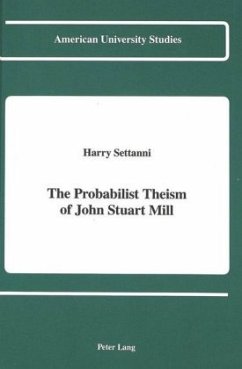Dr. Settanni's fascinating study of John Stuart Mill's outlook on religion probes certain fundamental tensions and contradictions in his thinking. What is described herein is the history of one thinker who could not fully embrace the theism of orthodox religions and yet who could never be content with skepticism either. His education in philosophic Utilitarianism led him toward agnosticism. His wife's death led him toward belief. These same tensions are present, although in an admittedly more abstract manner, in his philosophy. The text reveals how Mill attempted to resolve these contradictions by a probabilist form of Theism, and the question remains as to how ultimately successful he was.
"Settanni has given us a highly original, provocative, well-measured presentation of Mill's theory of God and religion. One may not agree with everything the author presents but one cannot but be stimulated by Settanni's attempt to force Mill's thought to be measured by the bar of logical consistency." (Lawrence A. McKinnon, St. Joseph's University)
